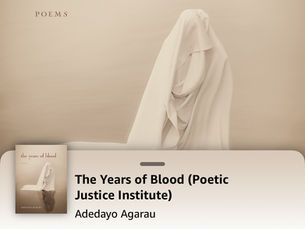Penned in Rage Literary Magazine
NEWS
The Annual Bridgette James Poetry Competition To Search For A Poetry Champion, Returns on Wednesday April 1st 2026. Closes midnight BST on Thursday 30th APRIL 2026.
Disclaimer: By entering the competition ONLINE, you are automatically agreeing to subscribe free of charge to the website, in order to receive updates about the competition shortlist/winner/s & our quarterly journal. Thank you.
CLOSED
Enter From April 1st to April 30th. Please Submit Entry as a Word Document.
You Must Include a 50-Word Author's Bio as Proof of Previous Publication History, for the Selection Panel.
Entrants Must be From Sub-Saharan Africa or its Diaspora.
2. Or By Email (Please Subscribe First. Opens Email App On Your Device)
3. Or Please Email Your Word Document to the Admin: Mr Lergon Parris, at contact@ellaspoems.com
Thank You.
No PDFs/Google Docs Will Be Processed or Read.
Warning: Please Do Not Include Bank Details Or Confidential Information In Your Submitted Document As Some Previous Entrants Have Done. You Will Be Contacted by Email If Placed.
Kindly Do Not Enter More Than Once.
Click to Read Rules
Prizes:
Paid Via a Money Courier, Such as Remitly or Western Union into the Winner’s Bank Account.
First Place - $100 USD + Publication in Anthology: Winner Appears on Blurb. Example: Soil Unfurling from Stem
Second Place - $20 USD + Publication of two (2) Poems in Anthology
Third Place - $10 USD + Publication of Poem in Anthology
Commended & Youngest Submitter - $10 USD
Best Regional Submitter -$10 USD
Disclaimer:
All shortlisted entries will be offered a contract and included in a winner’s anthology to be published on Amazon KDP.
What Sort of Winner are You Looking for?
Overall, a seasoned and established writer. Last year’s winners: Osahon and Chukwuebuka’s shoes are big ones to fill. The winner has to be professional enough to represent the region of sub-Saharan Africa, its diaspora and Ella’s Poems Project well. Someone who speaks excellent English, is highly educated, likeable and is happy to be identified on social media.
Before the top ten entries are forwarded to the Head Judge, I always conduct a thorough background check to ensure the right winner/s is/are picked.
Enter Competition Online: April 1st - April 30th, 2026

Head Judge: Chinua Ezenwa-Ohaeto Will Read the Best Competition Entries. OPENS April 1st, 2026
I’m pleased to announce that head judge for the 2026 poetry competition is Chinua Ezenwa-Ohaeto.
Chinua Ezenwa-Ohaeto is a PhD candidate in Creative Writing at the University of Nebraska-Lincoln, where he is also a teaching assistant. He holds a Master of Arts in English Language and Literature.
Chinua Ezenwa-Ohaeto is the author of a collection of poems: The Naming (University of Nebraska Press, 2025) and the chapbook: The Teenager Who Became My Mother.

Photo: Chinua Ezenwa-Ohaeto
I’m pleased to announce that the 2025 poetry champion will serve as a member of the judging panel in 2026.
Osahon Oka is an English Language and Literary Studies graduate. He is a Pushcart nominee too, whose poems have appeared in journals and magazines like Sontag Magazine, Kinpaurak, Poetry Sango-Ota, Feral Poetry, and elsewhere. His poems have won numerous awards such as The Kukogho Iruesiri Samson Poetry Prize (2nd Place), and the Visual Verse Autumn Writing Prize, 2022.

Photo: Osahon Oka
I’m pleased to announce that Dr Jive Lubbungu will serve as a member of the judging panel in 2026.
Zambian Dr Jive Lubbungu, a PhD Lit., MA Lit., MBA -Project Management, Cert. -Monitoring & Evaluation, Cert. Project Consultancy, Cert.- Climate Change AI Lecturer, Author, and Researcher, Assistant Dean Postgraduate - School of Humanities and Social Sciences He currently lectures at the Kwame Nkrumah University, Kabwe, Zambia.
ORCID iD: https://orcid.org/0000-0002-6562-547x
LinkedIn Link: www.linkedin.com/in/jive-lubbungu-5222157a
Google Scholar Link: jive lubbungu - Google Scholar
ResearchGate Link: ResearchGate
Website: https://www.nkrumah.edu.zm/home/

Photo: Jive Lubbungu
I’m pleased to announce that Gary W. Bryant will serve as a member of the judging panel in 2026.
Gary W. Bryant’s love for storytelling began in Southeastern Kentucky, where he won a creative writing award in high school. He honed his craft at the University of Kentucky under the mentorship of literary greats Gurney Norman and Ed McClanahan. Though his early career led him into journalism, working as a reporter, editor, and magazine editor-in-chief. His passion for fiction never faded. After founding a publishing company focused on marketing and training newsletters, he returned to fiction in 2021. His debut novel, Ace of Hearts, released in July 2022, blends mystery, friendship, and romance. His sequel, Ace Johnson, continues his signature deep character development and compelling storytelling.
https://www.garywbryantbooks.com/

Photo: Gary W. Bryant
I’m pleased to announce that Lergon Parris will serve as the administrator for the 2026 poetry competition.
Lergon Parris is a national award-winning creative writer and author. As a Jamaican native, he often pulls inspiration for his pieces from the culture, crafting unique stories for all ages. He tends to utilize anthropomorphism in his more popular works, telling stories from the perspective of animals. These narratives are often used as metaphors for human conflicts.

Photo: Lergon Parris
They Will Be Joined By A Secret Panel of Readers Who Will Select The Best Entries
Previous Competition Winners
Mission Statement
Penned in Rage Journal amplifies voices from marginalized and underrepresented communities.
The Journal is part of the Ella's Poems Project, launched in January 2022. This project uses creative writing activities to achieve these objectives:
-
The main focus of this project is to promote a love for reading in sub-Saharan Africa.
-
Ella’s Poems targets young people in the African continent, between the ages of sixteen and thirty-five - who are active online - in a bid to create a writers' hub on Facebook. Many creatives have found this sort of networking has not only helped them improve their writing skills but more importantly they'd been able to discover local writing opportunities.
-
Ella’s Poem’s Project also celebrates the work of African creatives, such as their art, poems, stories and novels, irrespective of one’s social status.
-
Many of the creatives who have benefited from this initiative have never written a poem or story in English before. So, our free writing competitions and published books, positively impact their lives.
Links to Names of Judges are Displayed Below:
1. Mr Chinua Ezenwa-Ohaeto -
Https://ellaspoems.com/thebridgettejamescompetition#head-judge-chinua-ezenwa-ohaeto
Https://ellaspoems.com/thebridgettejamescompetition#judge-osahon-oka
Https://ellaspoems.com/thebridgettejamescompetition#judge-jive-lubbungu
4. Mr Gary W. Bryant
https://ellaspoems.com/thebridgettejamescompetition#gary-w-bryant
Please Be Aware You Need to Subscribe to the Website, in order to Participate. Thank You. You Will Receive Emails from: pennedinrage@outlook.com
Please familiarise yourself with the competition rules.
Simultaneous submissions NOT ALLOWED.
When the competition OPENS, please submit ONE poem ONLY on the topic: OUTSIDER. Only one poem can be submitted. However, I advise that you concentrate on drafting and redrafting your poem before submitting it. In the past grammatical errors have cost entrants a win.
"Don’t be too hung up on form. The content is far more important than how much the poem rhymes. Or how many literary devices you’ve used. Please do not waste your data sending in meters:"
Nigeria is a country of rivers. (a)
Outside, the harmattan wind gave me shivers. (a)
But I have hope, (b) that’s how I cope (b)
COPYRIGHTED (Name withheld)
"The above – a stanza from a formal poem submitted in 2025 - isn’t what I’m seeking. There’re numerous good poems in Penned in Rage Journal."
RULES:
• Submitters MUST send in an original piece of work. (I do run checks for plagiarism and AI-generated content on all selected poems. Contestants have previously been disqualified for submitting an already published or AI-generated piece.
All poems must be in English. You are reminded to proofread for spelling and grammar.
Orthographically challenged work will not be processed by the Admin or Reading Panel.
• All submissions must be in a Word.doc format please.
• You MUST enter under your real name. If using a pseudonym you MUST disclose your real identity to competition organisers.
• The competition is free to enter.
• Poems should be on the theme OUTSIDER, written in the first-person narrative.
• Poems must not exceed forty lines.
• Your work is accepted on the basis that this will be its first publication in Penned in Rage, Literary Journal, on my Social Media pages or this website.
• Poems cannot have been broadcast on any regional, national or online TV station or via any radio platform.
• Poems cannot have won any other competition.
• Poems must be written in English, but you can include phrases in your mother tongue or another language.
• You MUST NOT enter a poem written by more than one author
• Entries will be accepted from sub-Saharan Africa or its diaspora ONLY. You MUST indicate country you are submitting from.
• Rejected competition entries are deleted. Please ensure you keep a record of all poems entered and send copies only.
• Entries will NOT be accepted any other way, except via email address or online. All emailed or online entries must be received by midnight BST on Thursday 30th APRIL 2026. Late online entries will not be accepted under any circumstances.
• The head judge's decisions are final, and no correspondence will be entered into concerning his decisions.
• Due to the large number of entrants, I am unable to respond individually to submissions.
Rules: winners
-
By entering this competition, entrants agree that their poems and data may be used by Ella’s Poems, including for educational purposes as material for Bridgette’s Writing School, Facebook.
-
Due to the high number of submissions, only successful entrants will be notified. Details of the full winners list will be announced publicly on www.ellaspoems.com on May 30th 2026.
-
The winners will be paid via Western Union ONLY.
-
Photographs of winners will be displayed on www.ellaspeoms.com.
-
The copyright of each poem remains with the author. However, by entering the competition, authors of the winning poems grant Ella’s Poems the right to publish and/or broadcast their poem, and to do this before anyone else.
-
Authors of the winning poems will grant Ella’s Poems irrevocable, non-exclusive licence to republish the work in perpetuity, including (but not limited to): A winners’ anthology (to be published on Amazon; E-copies of which will be circulated FREE OF CHARGE).
.png)

Question from Page Follower: ‘Bridgette, As April Approaches, What Sort of Poems Are You Looking For?’ [Paraphrased]
I cannot guess which poem Head Judge: Chinua Ezenwa-Ohaeto will choose. I cannot even presume to know which poems the tiered panel: Judge 1- 3 (consisting of Dr Jive, Osahon and Gary) will like. Nor can I hazard a guess which ones the secret selection panel (here in the UK) will select for the judges to read and shortlist. All those are factors out of my and your control.
Nonetheless, I know from reading Chinua’s work that the lines in his poems aren’t extraneous; they do not contain superfluous words. Chinua seems to favour an exactness in language choice meaning his poems say what he wants them to say, by using the right words.
“Chinua employs language to do a task and doesn’t waffle” – B James.
There’s an absence of distracting elements used only for stylistic purposes. If you’re a writer who overuses the ampersand, en/em dashes and forward slashes, then you might need to refine your writing for this competition in order to maximise your chances of ending up in the top ten.
“Chinua’s work is neat, sleek and readable” – B James.
While not ordinary, Chinua’s work is definitely the kind you would read as part of a Literature undergraduate degree. Think of building a good lexical resource now and redrafting your drafts. LOL. Unlike me, please proofread and spell check.
“Chinua’s an English/Creative Writing teacher so you might want to dot your I's; mind your p’s and q’s” – B James.
![“ As April Approaches, What Sort of Poems Are Your Looking For” [Paraphrased].png](https://static.wixstatic.com/media/e2d5ae_6d0c10d6e8e9497c80b6600e30e7777c~mv2.png/v1/fill/w_587,h_622,al_c,q_90,usm_0.66_1.00_0.01,enc_avif,quality_auto/_%20As%20April%20Approaches%2C%20What%20Sort%20of%20Poems%20Are%20Your%20Looking%20For%E2%80%9D%20%5BParaphrased%5D.png)
As for me, a hundred dollars is a lot to give away to someone who hasn’t already made a name for themselves writing GOOD poetry. The unknown writer is always a big risk and outlets in the UK seem to avoid them. The reach of this platform in the stunning continent of Africa is wide enough to find the next Laurette.
Personally, I favour imagination over copycat writers who are so keen to impress us, they’re become a watered-down version of a big name. If I want to read X’s work, I can buy their chapbook. I don’t need you to try and emulate them and fail in the process. LOL.
My Tips are: -
-
Work on a captivating HOOK/Introductory Line. Makes sure you have good END/Take Home lines like Osahon Oka’s ones last year.
-
Stay focused. Write about ONE main aspect only in those 40-ish lines. Read and re-read your poem. Read it out loud too.
-
Avoid clichéd topics: the Biafran war; Nigerian politics, religion, slavery et cetera. I hate those topics, so you won’t WIN my (...)MONEY.
-
Write about yourself and your life circumstances like Chinua does. Write about contemporary issues in the NEWS and how they affect yourself or others you love or share a nationality with.
-
I like poems that focus on the minute rather than grandiose subjects. Pretend you’re an ant, a leaf, a strand of hair, a tooth – metaphorically speaking of course. Write from that perspective and ALWAYS subvert the narrative to WIN.
GOOD LUCK.
Ladies and gentlemen, please read advance notice regarding sending out hardcopies of books to AFRICA.
From May 2026 onwards, I will no longer post out copies of books to shortlisted contestants (with the exception of those in the United Kingdom) due to the postage and transportation costs involved, when sending parcels to your beautiful African countries.
If I can find a British press to merge with then perhaps that service will continue. It was foolish of me to think I could do it on my limited budget.
Along the way, I got defrauded by a Zambian publisher whom I paid via Western Union in June 2025, but Mr Kayika has since stopped communicating with me and didn’t publish the original thirty copies of Soil Unfurling from Stem. I've notified the authorities in Zambia.
After the 2026 poetry competition, a winners’ anthology will be published on Amazon. If you have friends and relatives abroad, you’re free to ask them to assist in sending out copies. You’d agree that's what other outlets do. All published writers receive a PDF copy of the book anyway.
Thanks for your custom.
Why the theme outsider?
Poetry has always been used in sub-Saharan Africa, to reclaim the narrative, from the work of the late human rights activist: Dennis Brutus to the evocative pieces of tragic Christopher Okigbo. Repressive policies in some African countries have led to certain groups or tribal communities being marginalised. Social groups such as gay people, those with Albinism, and individuals who suffer with mental disorders or physical disabilities do not always feel integrated into African societies.
Have you been marginalised?
Misogyny is on the rise in sub-Saharan Africa as well as in the United States of America/USA.
Anti-abortion laws are being implemented.
In 2025, what happens in a woman’s womb is now subjected to government policies.
Are you a woman affected by these policies?
Islamophobia is sadly on the rise.
Christians are reportedly being k!ll!d.
Are you a migrant encountering xenophobia or living in fear of harsh government policies?
.png)
In popular narrative Brown people are being demonised. Far-right politicians have had their views amplified on social media platforms. Visa-bans have been put in place to restrict the movement of certain people. In America and the United Kingdom/UK, distrust of migrants has led to new State policies.
Are you a migrant impacted by these policies?
Islamophobia and anti-Christian sentiment are becoming increasing common. Where do you stand?
Can you practise your religion freely?
Do you feel as if you don’t belong?
Have you recently moved to new neighbourhood/town/country?
Censorship: I do not censor your writing, nonetheless, contestants are expected to stay within the jurisdiction of their (African) countries. Please remember that when submitting poems. Don’t oust yourself and risk the venom of homophobic people. In order for your submission to be accepted, you are expected to respect the human rights of all. No hateful poem allowed. Please familiarise yourself with banned words that social groups in the UK might find offensive.
Thanks for reading.
Good luck.
Format
Please submit your entry in a word document. It would be helpful if you state a word count as well. You must state your name and indicate the (African) country you're submitting from. An example has been provided. No PDFs accepted.
Thank you.

The Following Poems Were Placed, Commended or Won a Special Prize in May 2025
Entry 770822 - 'Big Lights Thunder' Matched to runner-up, Chukwuebuka Freedom Onyishi -$10 USD + Best Metaphorical Poem - $5
Entry 58622 - 'All of it' Matched to Solomon Hamza - $10 USD
Entry 50870 - 'Prayer' Matched to winner Osahon Oka - My Favourite Poem: $20 USD + $40 USD
Entry 46770 – 'The Path I Learned “Wilt”'Matched to Egharevba Terry - Judges' Favourite Piece- $10 USD
Entry 12977 – 'Sigh' Matched to Clement Abayomi - Third Place- $10 USD
Entry 30466 - 'House of Water' Matched to Daniel Jacinth - Fourth Place - $10 USD
Youngest Shortlisted Contestant - Fifteen-year-old Utaara Tjozongoro - $10 USD
Vacancy: Story Editor: Penned in Rage Journal
Penned in Rage Journal: Call for Editor
Seeking an Experienced Editor for Short Stories, Essays, and Nonfiction Selection
About the Role
From May 2026, Penned in Rage Journal is seeking a passionate and discerning editor to join our team. Your principal responsibility will be to read and select outstanding short stories, essays, and nonfiction pieces for forthcoming issues of the journal.
Candidate Requirements
-
Academic Qualifications: Master’s degree or higher in English Language, Literature, Creative Writing, Journalism, or a closely related field.
-
Publication Record: Demonstrable experience of being traditionally published.
-
Editorial Acumen: A keen eye for compelling narratives, originality, and literary quality across genres.
Compensation
This is a token-paid position. The selected editor will receive $10 for each reading session: May; August and January.
How to Apply
If you meet the above criteria and are enthusiastic about curating quality writing, please send a a brief cover letter highlighting your (editorial/writing) experience, and links or references to your published work. Click Link.
I look forward to discovering your editorial voice and working together to bring exceptional writing to our readers.
Sincerely
B. James

.png)
VACANCY: Creative Journalist / Blogger
Penned in Rage Journal is seeking a skilled creative Journalist/Blogger to produce a monthly report on news and issues relevant to creatives across Sub‑Saharan Africa. The role requires factual, engaging writing, fluency in English, and the ability to capture original photographs.
Key Details
-
Start Date: 1 March 2026 (ongoing)
-
Report Length: Up to 1,000 words
-
Compensation: USD $5.00 per published feature
Requirements
-
Strong writing and communication skills
-
Ability to research and report accurately
-
Access to a device capable of taking original photographs
To express interest, please click this email link:
Read Blog Posts
Read the winning poems from the poetry competition in 2025
This Month's Featured Creative
This is a self-funded project. If you like what we do, please tip the Editor of Penned in Rage Journal. A payment of $3 USD is advised. Thank you very much for your kind donation.

.png)



























